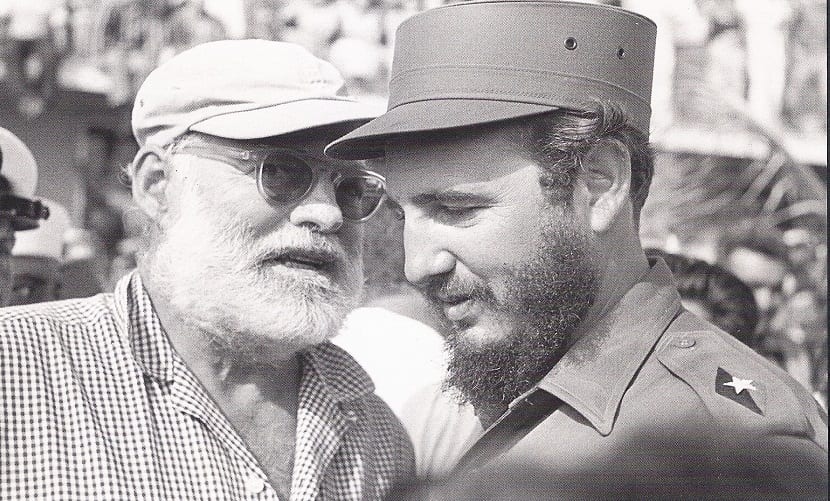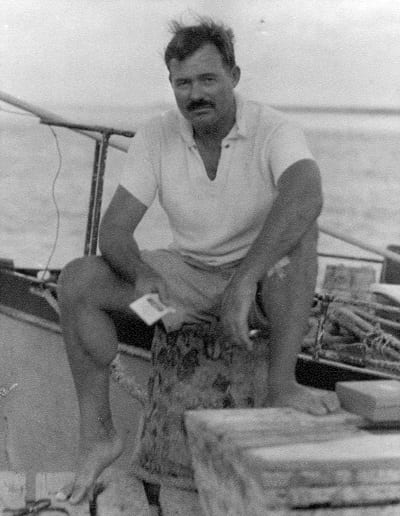Arnold Samuelson, a young journalist only 22 years oldDetermined and adventurous, he embarked on a great journey through his country after finishing his university studies. He packed a couple of necessities in his backpack, along with his violin, and sold a number of items to a local newspaper to help him set out on the journey. On his return to Minnesota, back in April 1934, he read for the first time a short story by Ernest Hemingway in the newspaper Cosmopolitan. The story in question was titled "A trip to the other side", which would later be part of his novel "To have and not to have."
The young man was so impressed with the reading of the story that he had no choice but to undertake a journey of more than 2.000 miles hitchhiking, just so she can see Hemingway and ask him for advice.
Arnold Samuelson did not have what is said to be a smooth and easy ride. Step Florida to Key West jumping from train to train and stopping at a pier to sleep in the open. The weather, he later recounted, was not exactly good. He also slept in a prison bull pen, which he says was infected with mosquitoes. Despite all this, nothing took away his commitment and enthusiasm to meet the one who for the moment was his favorite writer, and willingly appeared at the door of his home. Samuelson relates it like this:
When I knocked on the front door of Ernest Hemingway's house in Key West, he came out and stood in front of me, serious and annoyed, waiting for me to speak. I had nothing to say to him. I couldn't remember a single word of my prepared speech. He was a large, tall man with broad, drooping shoulders, who stood in front of me with his feet apart and his arms dangling at his sides. He was crouched slightly forward with the instinctive poise of a boxer ready to punch.
The writer asked him what exactly he wanted, to which the young writer replied that he had read his last short story published in Cosmopolitan and that he had been so impressed, that he had not been able to avoid going to meet him to chat with him. Hemingway was busy at the time, but with a relaxed and cordial tone he invited him to come over to his house the next day.
The next day they started chatting and when Arnold Samuelson confessed that he did not know how to write about fiction, who had tried without success, Ernest began to advise him:
"The most important thing I've learned about writing is that you should never write too much at once," Hemingway said, touching my arm with his finger. “You never have to do it in one sitting. Leave some for the next day. The most important thing is knowing when to stop. When you start writing and everything is going well, come to an interesting place and when you know what is going to happen next, that is the time to stop. Then you have to leave it as it is and not think about it; let it rest and your subconscious mind do the rest. The next morning, when you've had a good sleep and you've rested, rewrite what you wrote the day before until you get to the interesting place where you knew what was going to happen next. Write again and repeat the sequence again, leaving it at the next interesting point. And so on. That way, your subject will always be full of interesting places. It's the way to write a novel that never stalls and is interesting as you go along. '
Ernest Hemingway, among other things, advised the boy not to focus on contemporary writers. According to the great writer, you had to compete with the classics, with the now deceased writers, which according to him were the ones who made his works resist the passage of time. The writer invited Arnold to his workshop. He describes his experience in it as follows:
His workshop was the garage at the back of the house. I followed him to a staircase outside the workshop, which was a square room, with a tiled floor and closed windows on three walls and long shelves of books below the floor windows. In one corner there was a large antique table with a flat top and an antique chair with a high back. EH took the chair in the corner and we sat across from each other on either side of the desk. He picked up a pen and began to write on a piece of paper. The silence was very uncomfortable. I realized that he was taking his time writing. I would have liked him to entertain me with his experiences, but I finally kept my mouth shut. I was there to take everything he was going to give me and nothing more.
What Ernest Hemingway was writing was a list of 14 novels and 2 stories that he recommended the boy to read. These are the 16 books that Ernest Hemingway recommended to a young writer in 1934:
- "Anna Karenina" by Leon Tolstoy.
- "War and peace" by Leon Tolstoy.
- "Madame Bovary" by Gustave Flaubert.
- «The blue hotel» by Stephen Crane.
- "The open boat" by Stephen Crane.
- Dubliners by Jame Joyce.
- "Red and Black" of Stendhal.
- "Human servitude" of Somerset Maugham.
- The Buddenbrooks by Thomas Mann.
- "Far away and a long time ago" by WH Hudson.
- "The American" by Henry James.
- "Greeting and goodbye" (Hail and farewell) by George Moore.
- "The Karamazov brothers" by Fyodor Dostoyevsky.
- "The huge room" by EE Cummings.
- Wuthering Heights by Emily Brontë.
- "The Oxford Book of English Verse" by Sir Arthur Thomas.
Ernest Hemingway Documented Biography
Then we leave you with a video of the biography of Ernest Hemingway. It is a very complete biography (the video lasts about an hour and a half) in which not only the life and work of the author are analyzed, but also the author and one of his fellow writers can be seen talking.
Ernest Hemingway Phrases and Quotes
And to end this long but entertaining article, a classic, some famous phrases and quotes said by the author himself:
- "Good people, if you think about it a bit, have always been happy people."
- The best way to find out if you can trust someone is to trust them.
- "Now: a curious word to express a whole world and a whole life."
- Don't do what you honestly don't want to do. Never confuse movement with action.
- Always stay behind the man who shoots and in front of the man who is shitting. That way you are safe from bullets and shit.
- «If we win here we will win everywhere. The world is a beautiful place, it is worth defending and I hate to leave it.
- "Never think that a war, no matter how necessary or justified it may seem, is no longer a crime."
- "Try to understand, you are not a character of tragedy."
- "I felt the loneliness of death that comes at the end of each day of life that one has wasted."
- "When hearing an echo, many believe that the sound comes from it."




Very good review. I have taken the liberty of divulging it.
The video is very interesting and I coincide in my life with the mentality of this exceptional journalist and writer at the same time.
It is a pity that today's youth are unaware of the work of this author.
Being born in the nineteenth century was the key so that he did not manage to polish the machismo of the times, such as smoking or drinking excessively, which was very masculine. Without a doubt, a man with many virtues and some other flaws. Great and unrepeatable.